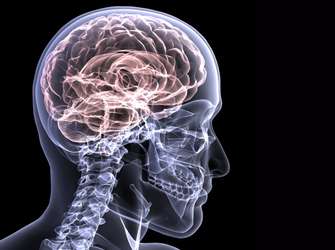Genes exhibit different behaviours in different stages of development

The effect that genes have on our brain depends on our age. These are the findings of a group of researchers from the MedUni Vienna. It has been known for a number of years that particular genetic variations are of importance for the functioning of neural circuits in the brain. Just how these effects differ in the various stages of life has until recently not been fully understood. This international study has been able to demonstrate that genetic variations at different times in our lives can actually have opposite effects on the brain, which provides an explanation for the differences that clinicians observe in the psychiatric symptoms and response to medications of adolescents and adults.
The group of researchers from Vienna, in collaboration with international cooperation partners, has shown that the effect of a psychiatric risk gene on a resting state network in the forebrain depends greatly on the patient's age.
The human forebrain is crucial for planning and action, which are closely interwoven with concentration, attention and memory functions. The nerve transmitter substance dopamine orchestrates the activity of neurons in the forebrain in order to ensure an ideal level of functioning. The amount of dopamine in the brain is not constant for life, however. Instead, it rises until adolescence and then falls by the time the individual reaches early adulthood to a much lower level. When the dopaminergic control function collapses, serious mental illnesses such as schizophrenia, depression or attention deficit / hyperactivity disorder (ADHD) can result that usually start around the period of transition to adulthood.
For a number of years, doctors have known that a risk gene involved in dopamine metabolism (COMT) can affect neuronal regulation of the forebrain in adults. Carriers of risk gene variants are more prone to dopaminergic mental illness.
The interaction of genes and stages of development
As part of the study, carried out at the MedUni Vienna's University Department of Psychiatry and Psychotherapy (led by Siegfried Kasper), the study team used magnetic resonance imaging data from a large random sample of over 200 test subjects to analyse the complex interaction between stages of development and genetic variations in the COMT gene and how it affects the resting state network of the forebrain.
Some of the magnetic resonance scans were performed in Vienna (Centre of Excellent, High-Field MR, Department of MR Physics, Head: Ewald Moser) and some as part of an EU project (Institute of Psychiatry, London, Head: Gunther Schumann). Gene analyses (COMT Val158Met) were carried out in Vienna (Univ. Dept. of Laboratory Medicine, Harald Esterbauer and colleagues) or as part of the EU project.
"Our age has a crucial influence on the effects of psychiatric risk genes. A gene that has positive effects during puberty can be bad for us in adulthood," says study leader Lukas Pezawas, describing the results. In the study, adolescents exhibited contrary gene effects on the brain compared to adults.
The study highlights the dynamism of gene effects on brain function throughout the various stages of life such as adolescence or adulthood. "These results are important for understanding the onset of illness in conditions such as schizophrenia, depression or ADHD, which mostly occur at the threshold of adulthood. Our results also show that there are fundamental differences in the dopamine system between adolescents and adults, which we need to take into account in future treatments", explains Pezawas.
The study by primary authors Bernhard Meyer and Julia Huemer, published in the highly respected journal Brain Structure and Function, was funded with resources from a special research program by the Austrian Science Fund and an EU project.
More information: Meyer BM, Huemer J, Rabl U, Boubela R, Kalcher K, Banaschewski T, Barker G, Bokde ALW, Beuchel C, Conrod P, Desrivières S, Flor H, Frouin V, Gallinat J, Garavan H, Heinz A, Itterman B, Jia T, Lathrop M, Martinot JL, Nees F, Rietschel M, Smolka M, Bartova L, Popovic A, Scharinger C, Sitte H, Steiner H, Friedrich MH, Kasper S, Perkmann T, Praschak-Rieder N, Haslacher H, Esterbauer H, Moser DA, Schumann G, Pezawas L. (2014) "Oppositional COMT Val158Met Effects on Resting State Functional Connectivity in Adolescents and Adults." Brain Struct Funct: in press.


















